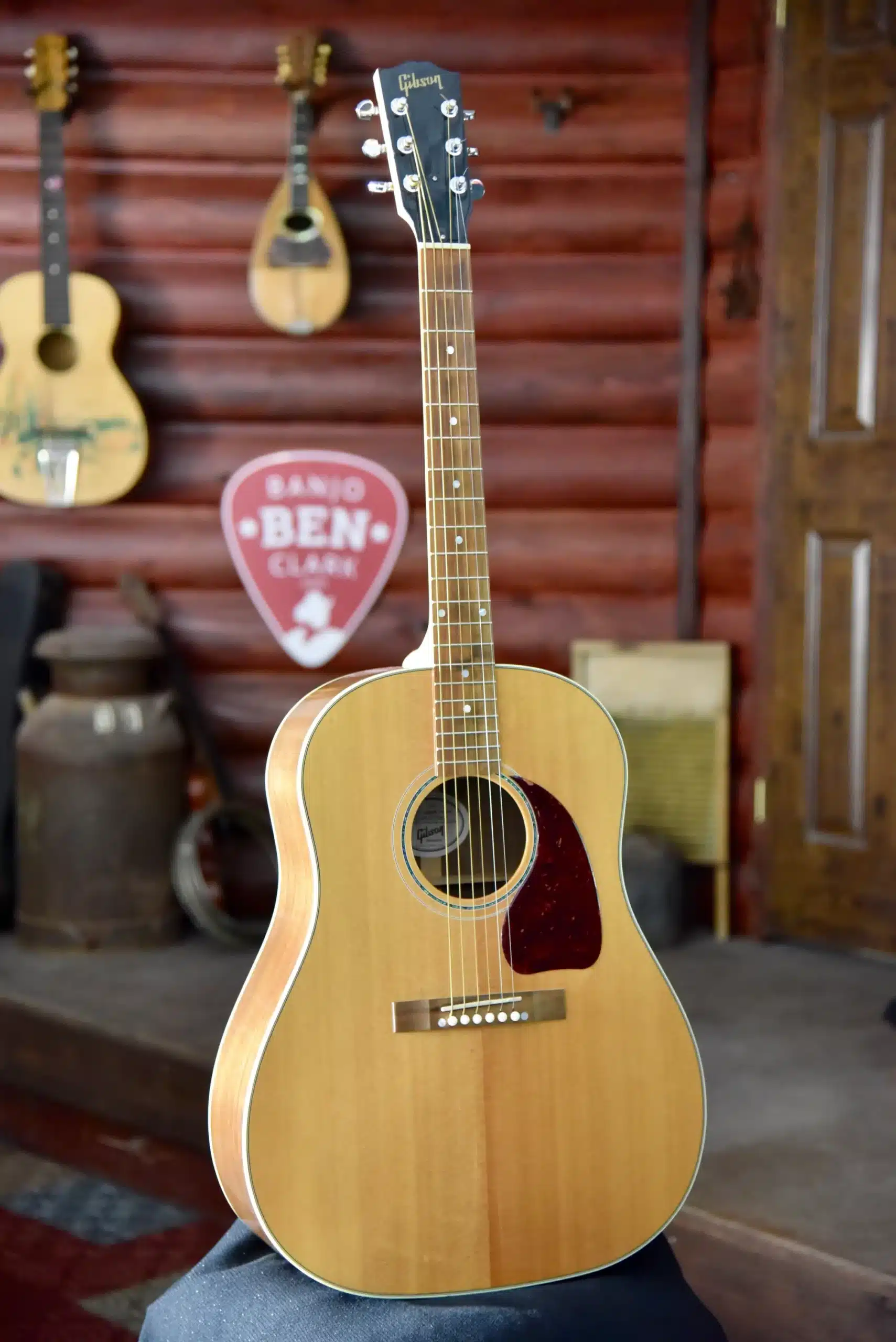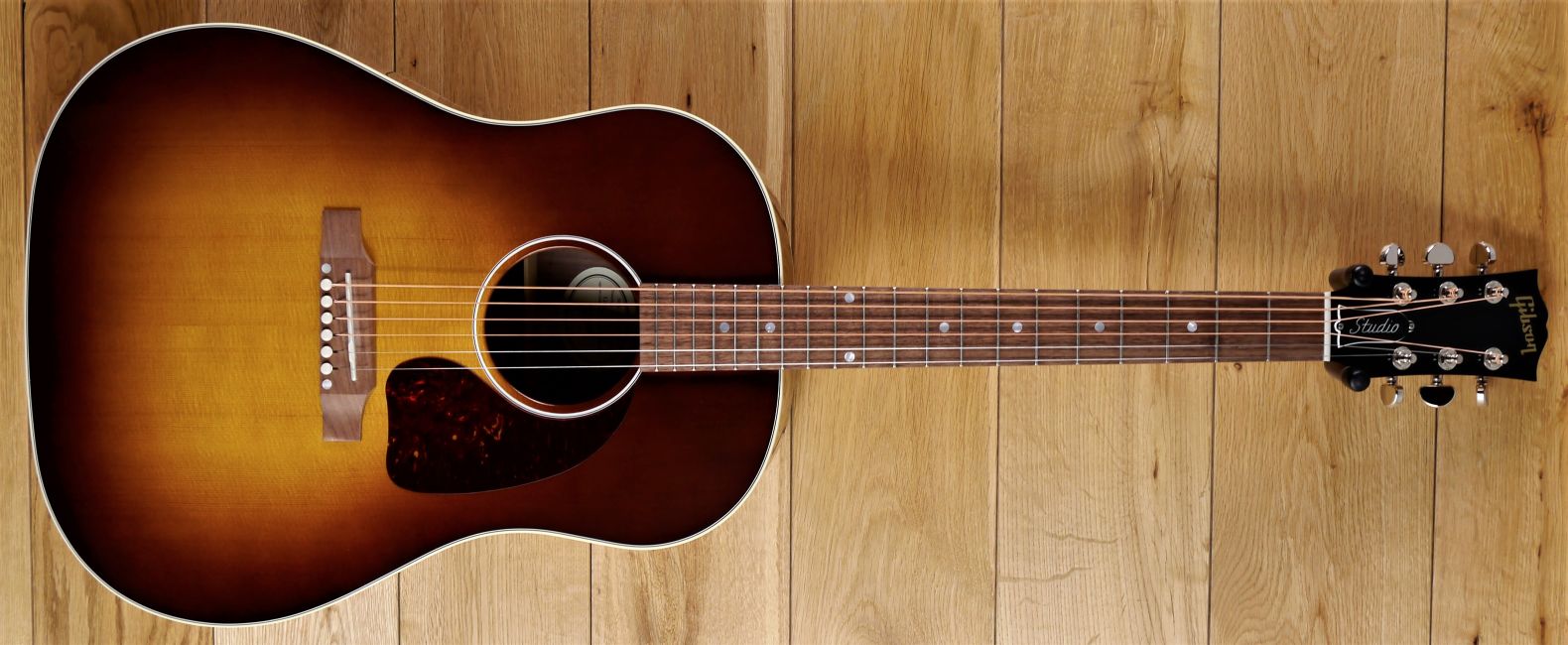Contents
You like the J series of Gibson and gravitate toward J15 in addition to J45? You can only buy one between the two yet it’s hard to tell which one is the superior guitar? You want to ensure that you won’t end up regretting your decision later on? In that case, my article is going to be your best bet.
Down below is everything that you must consider as you look for the winner in Gibson J15 vs. J45. Read to the end, get a good grasp of what to expect from models in the J series and make your purchase accordingly.

Insights Into J15 And J45
Outlines
| J15 | J45 | |
| Bridge | Rectangle | Belly up |
| Neck | Slim Taper | Advanced Response |
| Tuners | Grover Mini Rotomatics | Grover Nickel Rotomatic |
| Material | Walnut and maple wood | Mahogany and rosewood |
| Cost | Between $1,800 and $2,000 | Around $2,999 |
| Status | Discontinued | In production |
Reviews

Material
In case you don’t know, Gibson builds J15 using a combination of walnut and maple wood which make it strong as well as light. About J45, it consists of mahogany and rosewood that guarantees longevity in a wide range of conditions. Both Gibson guitars feature fantastic finish so they have similar scores in terms of aesthetics. All in all, you may rest assured knowing that regardless of your choice, your guitar will hold together and maintain a good look over time.
Sound
Generally speaking, Gibson J15 is capable of delivering crystal-clear sound as well as a luxurious resonance for most of the time. Aside from that, the amount of sustain of J15 is decent and its tone spectrum is well-balanced. If you manage to nail the chords, you shall achieve unparalleled sweetness for the melody. For optimal results, you should play J15 by strumming the strings but it’s fine to resort to fingerstyle.
About Gibson J45, it’s known for its emphasis on treble and mid-range tones which make it popular among lead guitarists. Several people notice a little dampening every time they play J45 but that is not serious by all accounts. In fact, unless you cut off the chords on a regular basis, it’s highly unlikely that you will notice dampening. Depending on the situation, you can play J45 alongside outboard mics and strumming is the way to go.
Playability
For your information, the friendly profile of Gibson J15 ensures a comfortable playing experience for guitarists. If you opt to get a J15, it won’t take much time for you to get used to the strings, fretboard and so on. Similar to its predecessors, Gibson J45 also proves to be an ergonomic guitar that everyone can play with relative ease. Assuming that you know how to handle guitars in the J series of Gibson, you may rest assured knowing J45 won’t give you a hard time.
Acquisition
It’s natural for the price of Gibson guitars to fluctuate but on average, J15 is more affordable than J45. Consequently, a lot of guitarists who have modest shopping budgets regard J15 as the winner in Gibson J15 vs. J45. That being said, there is one thing you need to keep in mind: J15 is no longer in production but Gibson still markets J45. That means while getting brand-new J45 guitars is a straightforward affair, you have to settle for secondhand examples once it comes to J15.
Summary
At the end of the day, it’s up to you to decide the one that comes out on top in Gibson J15 vs. J45. If you have money to spend and seek something modern, it’s suggested that you invest in a Gibson J45. In the case that money issue prevents you from getting J45 and you feel fine playing used guitars, find yourself a Gibson J15. Prioritize well-known retailers so you don’t get swindled and end up paying more than you should.
How To Maintain Gibson Guitars
Nothing lasts forever but if you look after your Gibson guitars, it’s going to stay in good conditions for decades to come. Here is a list of tips and tricks that will help you keep the instrument in top shape:
- Clean the fretboard: In layman’s terms, all sorts of things from oil to dirt accumulate on the fretboard of guitars over time. That is why it’s a good idea to clean the fretboard from time to time using a combination of cloth and soft bristle toothbrushes.
- Wipe the strings: Every time you pick up your guitar, remember that some of the sweat will linger on the strings at the end of the playing session. To keep the sweat from running the strings, you must wipe the strings as thoroughly as possible.
Lubricate the nut: It’s not uncommon for an aged nut to mess up the tune and sustainment of guitars on occasions. By putting together a schedule for nut lubrication, you can maintain the sound of your guitar throughout the years.

Hi music fan! I am Jeff. Hope that you enjoy some stuff I shared here in my personal blog.
About myself, Currently I am in charging as Artist Manager/Music Supervisor at 72 Music Management. I did managed album to Grammy Award in 2017 with 7 Nominations from 2014-2020 and had the opportunities to work with : A.J. Croce, Blind Boys of Alabama, Bobby Rush, Dom Flemons, Dustbowl Revival, Sarah Grace
Governor of the Memphis Chapter of The Recording Academy is one of a award that I am lucky to achieved.
